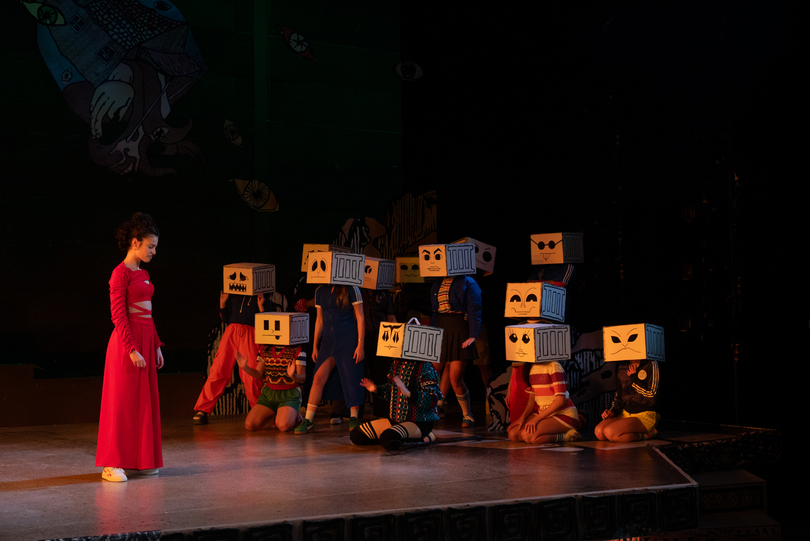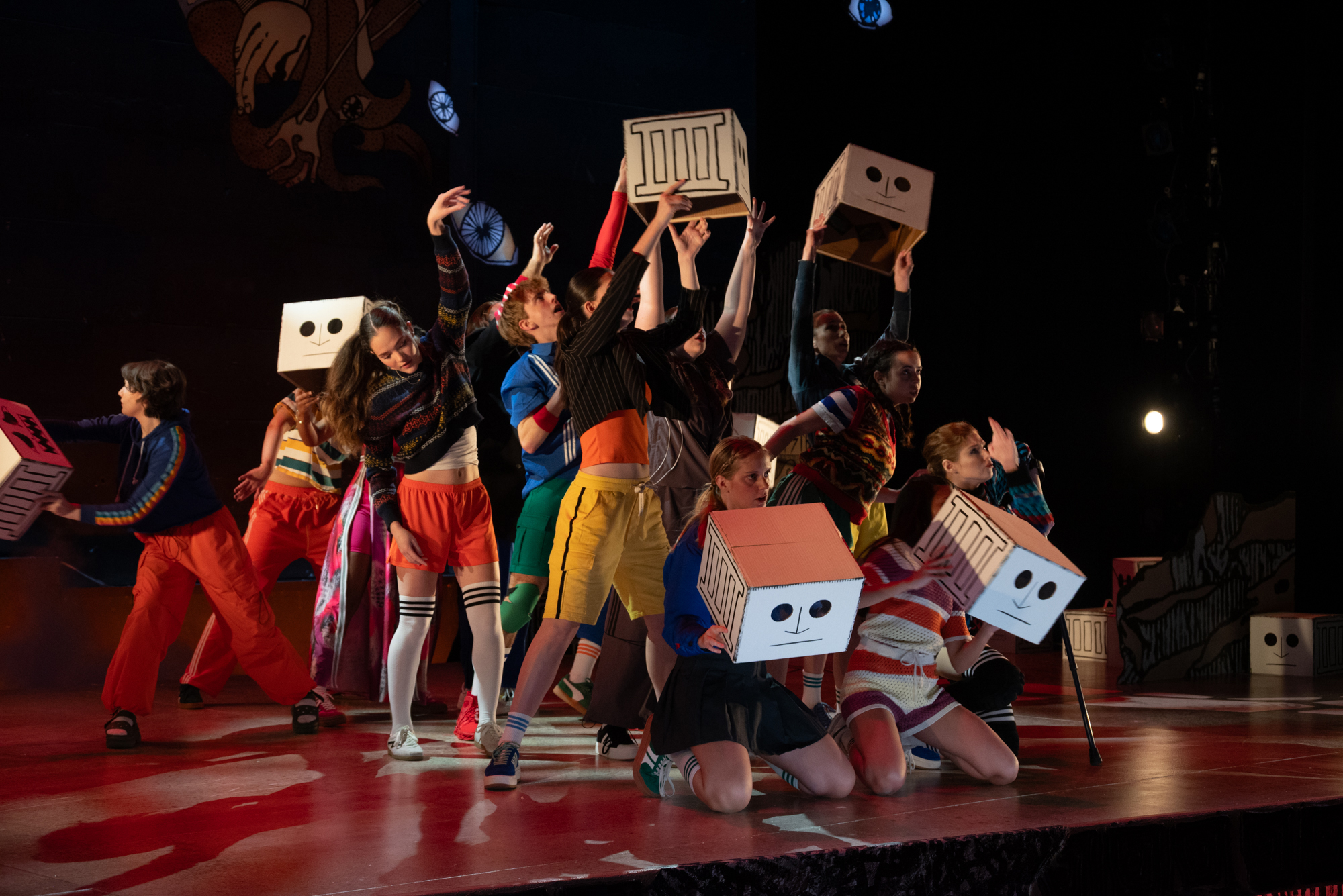Department of Drama’s ‘Antigonick’ revisits timeless Greek tragedy ‘Antigone’

An chorus responds to the events onstage and interacts with the audience as they react. Actors in the chorus constantly switched sides, supporting different characters throughout the drama. Christian Calabrese | Asst. Photo Editor
Get the latest Syracuse news delivered right to your inbox.
Subscribe to our newsletter here.
Actors dressed in modern sports clothing reference philosophers like Hegel and Beckett, hoping to bring the Greek tragedy “Antigone” into the present through their performance of “Antigonick.” Salma Mahmoud said she was surprised by how relevant the play is.
“Many years have passed since the original story was written, but a lot of it pertains to today,” Mahmoud, a Syracuse University senior, said. “It’s an interesting play that stays true to its core, but also tries to be relatable to our time.”
SU’s Department of Drama is performing “Antigonick” by Anne Carson from Nov. 14-22 at Syracuse Stage/SU Drama Complex. A translation of Sophokles’ Greek tragedy “Antigone,” Carson rewrites the tragic, historic play in a timeless yet modern way, making it easily relatable to any point in time, Mahmoud said. Carson uses a translation that includes the spellings “Sophokles” and “Kreon.”
For SU senior Emily Pellecchia, putting on “Antigonick” is a full-circle moment. During her freshman year, she read “Antigone,” so she’s enjoyed returning to it this year.
Corrin Pulliam, another senior in the production, said the name “Antigonick” comes from a character Carson invented named “Nick.” In SU’s production, Nick is onstage the entire time, pouring sand into a well that’s draining through the bottom. The character represents the production’s focus on the theme of time, and running out of it, Pulliam said.
“Our costumes are sportswear, and there are a lot of different indications of time passed on the set itself,” Pulliam said. “A lot of the language is in that theme of time and repetition. It’s a very timely piece.”
Throughout the show, there’s a circular pattern of events repeating themselves, which is something Carson wanted to emphasize in her adaptation, Mahmoud said.
The story of “Antigonick” follows Antigone, the daughter of Oedipus. After a civil war kills her two brothers, Kreon — the king of Thebes — decides to honor one brother and leaves the other unburied. Antigone defies the king and buries her brother, believing that justice means more than her king’s word.
Kreon arrests Antigone, despite critiques from his son, the town prophet Teiresias and others. Before he can change his word, Antigone takes her own life, causing a series of dark events, including the death of Kreon’s son and wife. This leaves Kreon to cope with grief, guilt and growing remorse.
Despite the original story being written a long time ago, “Antigonick” is also a contemporary, political piece, Pellecchia said. It’s an old story, but the premise keeps repeating, she said, where a powerful figure dictates what is right and moral, even to situations they’re completely removed from.
Pulliam said Kreon is indicative of a lot of rulers from the past and present, and his character is very relevant.
“There are multiple Antigones in a generation,” Pulliam said. “We all have a little Antigone in all of us,” Pulliam said.

“Antigonick” is a political play, an actor said. A main theme is the importance of standing up for your beliefs. Christian Calabrese | Asst. Photo Editor
She compared Antigone to Greta Thunberg. Antigone and Thunberg are both loud and stand up to power, said Pulliam, and act as martyrs for what they believe in.
Pellecchia, who plays Antigone, said she feels very connected to her character. Since Pellecchia is a senior preparing for a new chapter, she resonates with Antigone’s scared emotions.
“She’s super strong and has a hard head, which I do as well,” Pellecchia said. “But at the end of the day, she’s scared, and it’s okay to be scared.”
“Antigonick” includes a Greek chorus on stage. They act as narrators and live reactors to what’s happening on stage, while also acknowledging the audience as Kreon’s council and the people of Thebes. The chorus’s goal is to have the audience better understand the story, but they also react in real time, Mahmoud said. She said being a part of the chorus has been a fulfilling challenge.
Pulliam plays Eurydike, Kreon’s wife, and is another member of the chorus. Throughout the show, the chorus tries to move through the audience’s internal thoughts, she said.
“Working on the chorus, I felt a collective breath and empathy,” Pulliam said. “It restored my hope that this can be easy in the real world — to organize ourselves and find harmony with others.”
The biggest challenge for the chorus was finding unity, Pulliam explained. Each member in the chorus had to fully commit and put a lot of trust into the directors and their vision, she said.
As part of the chorus, Mahmoud’s character is constantly switching sides. Sometimes she agrees with Antigone, and other times she agrees with Kreon. In some ways, she said, it’s similar to how society is today.
“It’s a representation of how we constantly change our minds depending on what will benefit us most,” Mahmoud said.
“Antigonick” also targets the political aspect of what theater can do, Mahmoud said. She said the Department of Drama chose to do the play right now, partially as a response to current events.
“A lot of things are happening that happened in the past, and there are clear solutions, but people are unwilling to listen,” Mahmoud said. “I think this play was chosen to draw attention to that.”
For Pellecchia, performing harsh topics on stage makes them more digestible. Being in a room with like-minded people allows you to process the play, making it easy to process real life, she said.
Audiences should take away how important it is to fight for their beliefs and how effective that can be, Pulliam said.
While the audience doesn’t see the aftermath of Kreon gaining wisdom from the events that occurred after Antigone’s death, they do see how Antigone’s words and her decision to die shook this society, Pulliam said.
“It is a very tragic play,” Pulliam said. “But there is a glimmer of hope that we have to use the time that is given to us to gain wisdom and make choices to better ourselves and the world.”





